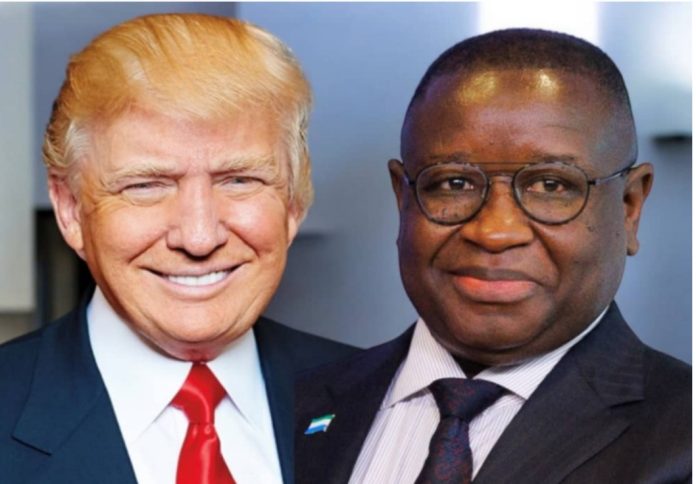AYV News, June 10, 2025
Sierra Leone’s Minister of Foreign Affairs and International Cooperation, Timothy Musa Kabba, has assured that hisgovernment is currently engaging with the United States to address the new Executive Order announced by the U.S Government.
The restrictions imposed a partial travel ban on Sierra Leone, citing high visa overstay rates and insufficient cooperation in repatriating deported nationals.
Speaking to AYV exclusively, Minister Kabba said: “We are currently engaging the U.S government and we have been very cooperative, because we know it is the right thing to do. We know anybody who bears our passport is assumed to be a Sierra Leonean because it is an indication and guarantee of our national document. We have been accepting deportees coming into Sierra Leone.”
He said the consequences of this suspension and its impact on genuine applicants are the function of the abuse of the visa privilege given to us, Sierra Leonean citizens, who go and overstay.
Bryan David Hunt, United States Ambassador to Sierra Leone, said at this time, the U.S is no longer going to be issuing Tourists, Business, Students and Exchange Visas, adding that Immigrant Visas will be primarily restricted to those who have family members in the United States who are citizens or legal permanent residents.
Ambassador Hunt said: “The primary motivation of the President of the United States is to ensure immigrants who want to travel to the U.S are appropriately vetted. At this time, he did not feel that we could appropriately vet all the immigrants who wanted to enter the U.S, so he imposed restrictions and prioritised those who have families in the U.S over those who do not. We are not revoking current visas. So, if you have a valid visa that was issued before the proclamation, you are free to enter the United States”.
The United States Ambassador revealed that Sierra Leone is the 13th highest overstay rate country for B1, B2 Tourist and Business Visas travellers in the world and the 8th highest overstay rate for Students and Exchange Visas in the world. Because of this, the President of the United States, resident Donald J. Trump did not feel he could continue in good faith to allow Sierra Leoneans to receive B1, B2 Tourists and Business Visas and Exchange and Students Visas, so he decided to impose restrictions upon those categories as well as upon a wide number of immigrant visas.
U.S. President issued a new executive order imposing a partial travel ban on Sierra Leone, citing high visa overstay rates and insufficient cooperation in repatriating deported nationals.
The restrictions which took effect on June 9, 2025, will suspend entry for Sierra Leonean nationals applying for immigrant visas and certain non-immigrant visas, including business, tourism, student, and exchange visitor visas.
The proclamation, signed on June 4, names Sierra Leone among seven countries—alongside Burundi, Cuba, Laos, Togo, Turkmenistan, and Venezuela—facing partial travel restrictions. Twelve other nations, including Iran, Libya, Somalia, and Haiti, remain under a full ban.
U.S. authorities highlight Sierra Leone’s B-1/B-2 visa overstay rate of 15.43% and an even higher 35.83% overstay rate for student and exchange visas. The order also criticisesthe West African nation for its historical reluctance to accept citizens ordered removed from the U.S., labelling it a national security risk.
The policy mirrors Trump’s earlier immigration restrictions, which targeted several Muslim-majority countries during his first term. While the Supreme Court upheld those measures, they faced widespread criticism as discriminatory.
In the latest order, Trump emphasised the need for foreign governments to improve identity verification and data-sharing practices. “The United States must ensure that admitted aliens… do not bear hostile attitudes toward its citizens, culture, or institutions,” the proclamation states.

